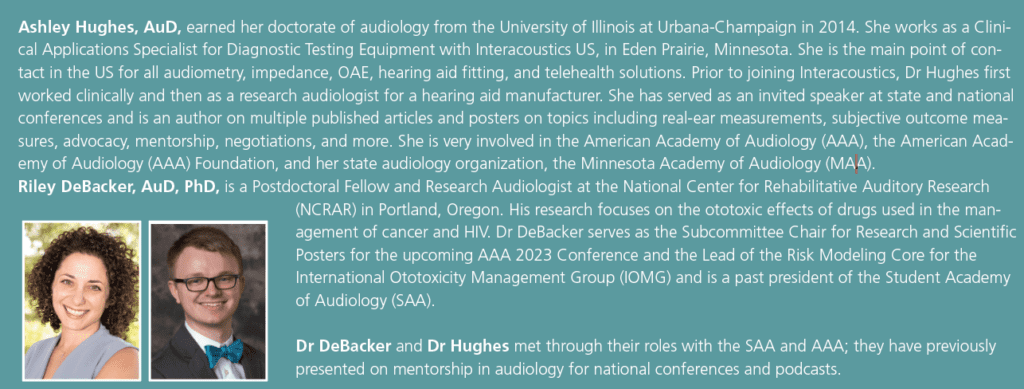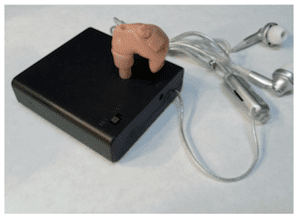Tech Topic | September 2022 Hearing Review
How to develop a mentorship program
By Ashley Hughes, AuD and Riley DeBacker, AuD, PhD
Audiology mentorship is a mutually beneficial professional relationship in which an experienced individual (the mentor) imparts knowledge, expertise, and wisdom to a less-experienced person (the mentee) while simultaneously refining their mentoring skills. Mentorship relationships can lead to increased confidence, skill development, job satisfaction, and more. Additionally, these benefits can positively impact the mentee and mentor, both personally and professionally, along with their employers, colleagues, families, friends, and more.
Mentorship can often be confused with other professional relationships, and understandably so. Some of them can feel quite similar, but there are differences. Outside of mentorship, other professional relationships include coaching, sponsoring, and managing.
Coaching is performance-driven and designed to improve the professional’s on-the-job performance. Unlike coaching, mentors can offer advice and guidance, however, the mentee chooses whether to implement said advice. Sponsorship helps you advance while a mentor will give you ideas on how you might advance. A sponsor is typically in a leadership position, and a person can only truly be a sponsor if they are able to create an opportunity for you that you otherwise would not be able to access on your own. Managing is the one we’ve all likely experienced. Management relationships are essentially directive commands with the goal of achieving specific results and objectives.
Mentoring is unique in that it is more development driven, looking not just at the professional’s current job function but beyond, taking a more holistic approach to career development. Unlike managing, a mentor’s key role is to transfer knowledge of specific information. Mentoring provides guidance and assistance and enables the supported individual to find solutions through the asking of direct questions. Unlike sponsoring, a mentor advises (vs advocating).
It is important to recognize that mentorship relationships require commitment from both partners. While not every partner will consistently contribute the same amount at all times, lop-sided relationships where only the mentor or mentee is consistently investing will not reach their full potential and may fizzle out. Some key elements of strong mentorship partnerships include the following.
Mutual trust. Just like most other relationships, mentorship is based upon mutual trust and open exchange between partners. When mentors and mentees can trust one another to meet deadlines, provide unbiased and direct feedback, and support one another, it provides the necessary foundation to ensure that both the mentor and mentee can invest their energy into the task at hand. When that trust is violated, it can damage the relationship and require an investment of time and energy into building in support to account for future breaches of trust that detract from the goals of the partnership. Fortunately, the next element can help to avoid many speed bumps that might erode trust.
Regular contact and conversation. Regular, open communication is a cornerstone of all successful relationships. This is a tip echoed in advice columns on romantic relationships, workplace development, and in maintaining friendships, so it should come as no surprise that mentorship relationships also require regular contact to be maintained. One of the number one reasons we have heard for mentorship relationships failing is that the mentee or mentor “never heard from” their partner. This is a complaint that arises equally frequently on both sides of these relationships because no matter the career stage, there are a lot of demands on our time! Worst of all, a lack of communication can lead new mentors or mentees to feel that they’re being “ghosted” and can sour future collaborations that the participants might have. To avoid becoming a mentorship poltergeist, we recommend beginning each new mentorship partnership by establishing a few key details.
By What Methods Will You Communicate?
Some mentors or mentees love the ease of texting as an initial communication, others use their cellphones for personal communication only and prefer to use email for professional correspondence, and still others might prefer to establish communication by meeting in person or talking on the phone. Most people probably would enjoy some combination of these methods and may have thoughts about what is appropriate at different times. By establishing when to or not to use different methods of communication early, it ensures that everyone has a clear idea of how to keep communication flowing!
How Frequently Will You Communicate?
A common fear we’ve heard from both mentors and mentees is that they’re reaching out too often, or not enough. By establishing early on how frequently you’ll check in with one another, it helps set these expectations. For example, if you have a planned quarterly meeting, then no one should be nervous when a month goes by without any contact. But just like you might renegotiate other parts of your mentorship relationship, communication needs may change over time. If you are accepted to present together at a conference, quarterly meetings are unlikely to provide enough time to develop your talk in that time frame and so you may negotiate a different meeting schedule for the length of that project. Similarly, it is important to discuss what to do if someone needs to reach out in between scheduled meetings. In the event that a mentee encounters a difficult situation that they’d like advice on or a mentor has an unexpected change in employment or other life circumstances, waiting several months might not make sense. In those situations, discussing whether a quick text, phone call, or email is welcome for time-sensitive matters can ensure that everyone can meet their needs.
Who Will Initiate Communication?
Lastly, make sure you understand who will reach out when. If a quarterly Zoom call is planned, but both parties expect the other to schedule, the meeting time may come and go with no mentorship in sight. Avoid this by discussing when to reach out and maybe even putting mentorship activities on the calendar to ensure important dates aren’t missed.
Desire to grow. As we’ve said elsewhere in this article, strong mentor relationships provide the opportunity for both the mentee and mentor to grow and learn from one another. While there is often a reasonable expectation that mentors will provide more direction and guidance in a target area or areas, mentors should also be willing to listen and grow based both on feedback and areas where a mentee may be more experienced. An excellent example of this can be found in the preceptor/student relationship. While students are coming in seeking guidance and development in the execution of clinical skills and the development of clinical judgment, students also provide mentors with unique opportunities to learn. When a student asks why a protocol or policy is designed in a certain way, it provides the opportunity to reflect on the reasons driving those decisions and if they still make as much sense as they did when established. Similarly, students are likely to have up-to-date knowledge in areas that may be less familiar to a preceptor and may be able to recommend relevant literature or explain the current state of science in a way that can benefit more experienced clinicians. When both the mentee and mentor are open to learning from one another, it provides the greatest benefit to both parties (both in knowledge gained and from the confidence boost that comes from teaching someone something new)!
Belief in the process. What we’ve outlined above can seem daunting. The idea of remembering important steps and proactively establishing boundaries and preferences can seem daunting. Especially when compared to “going with the flow” and allowing relationships to develop organically. It is important to note that those two things are not incompatible. Just like providing a tomato plant with a trellis allows it to grow to its full potential without breaking, providing some structure to a mentor relationship can provide it the strength it needs to flourish. That doesn’t mean every part of mentorship will come naturally or that you will never have questions, but it will hopefully provide a context to allow you to take calculated risks and learn from them. Remember that bumps in the road don’t mean that something is a poor fit or destined to fail, they’re a natural part of any new relationship! We’ve assembled these suggestions by combining our experiences with supervising mentorship pairs, reviewing literature on mentorship, and imparting lessons we’ve learned from our own relationships. We trust that these suggestions will enhance your mentorship relationships, both current and future, and we hope that you’ll trust that too!
Some of the benefits of mentorship to individual mentors and mentees are discussed above and were covered in greater detail in “Audiology Mentorship: Real World Benefits, Challenges, and Solutions” published in the Hearing Journal in February 2022.1 To briefly summarize, literature on mentorship has found the following benefits for mentees:2
• Higher salaries and greater career advancement;
• Increased job satisfaction and work-life balance;
• Decreased turnover and burnout.
All the above benefits were also found for mentors, who additionally see:
• Increased confidence and personal satisfaction;
• Expanded networking opportunities;
• Enhanced listening and interpersonal skills;
• Improved leadership skills and employer recognition.
While these benefits to individuals provide compelling reasons to enter mentorship relationships, the profession of audiology as a whole benefits by supporting strong mentorship. The improved confidence, decreased burnout, and increased job satisfaction that comes with mentorship provides direct benefits to patient care. By expanding networks and communities of knowledge, we enhance the quality of care provided and when audiologists in these partnerships see increased salaries and opportunities for career advancement, it increases metrics associated with salary and employment and provides models for other audiologists to help understand what is possible both inside and outside of our immediate professional spheres.
Finding and creating mentorships can feel very daunting initially. It’s important to first know what you hope to get out of your relationship; this can help determine the best path to finding a mentor and/or mentee. Think of people you know, within the profession or not, who exhibit characteristics you’d like to work on and grow. Conceptualize who and where you want to be in one, five, or ten years and find someone who is already at that stage or who embodies those skills. Don’t be afraid to “cold email” people who have the skills you are looking to develop. For example, if you are hoping to improve your presentation skills, looking at presenters in your area of interest at recent meetings is a great way to identify potential mentors. Simply shoot them an email asking if they’d like to co-author an article or co-present at an upcoming meeting. While it may feel odd to email someone out of the blue, it often feels great to have your work recognized and many experienced professionals enjoy working with new audiologists who are excited about their area of expertise! Well-known presenters are often invited to speak at more meetings than they can attend, so they may be eager to have someone to pass those opportunities along to. These kinds of relationships help develop your skills while growing your network and reputation. And it can all begin with a simple phone call, email, or quick meeting!

Citation for this article: Hughes A, DeBacker R. Fostering the future of audiology through mentorship Hearing Review. 2022;29(9):18-20.
References
- Wolfgang K. Audiology mentorship: Real world benefits, challenges, and solutions. The Hearing Journal. 2022;75(2):18-20.
- Hawkes S. Supporting women’s mentoring in higher education: A literature review 2010. https://www.genderportal.eu/resources/supporting-womens-mentoring-higher-education-literature-review-2010. Published 2012.





